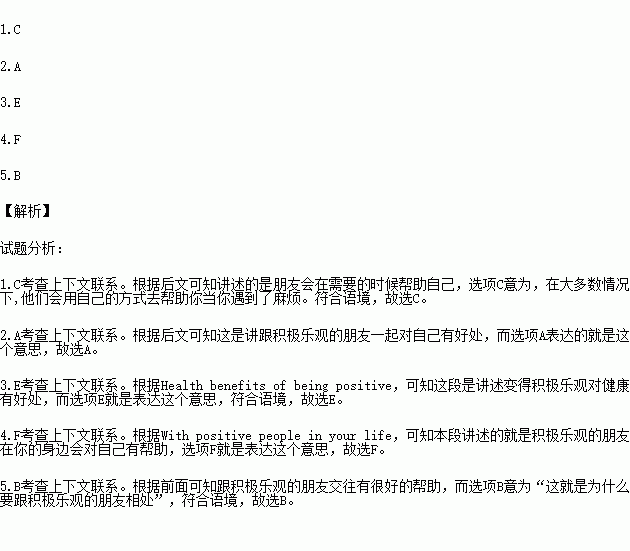题目内容
根据短文内容,从短文后的选项中选出能填入空白处的最佳选项。选项中有两项为多余选项。(注意:如果选E,请涂AB;选F,涂AC;选G,涂AD)
There’s no doubt that when it comes to friendship,you want positive people in your life and not negatives ones. 1.
Support when you need it·
With positive friends,you don’t need to beg for help when you need it because chances are they will be there for you without asking. 2.
Health benefits of being positive.
The more positive friends you have,the better you will be at remaining optimistic yourself. 3. For example,it helps people to deal with stress and illness better.Health benefits may include lower rates of depression,a greater ability to throw off colds,and a reduced risk of developing disease.
Bring out the best in you.
4. This means  trying new things,achieving goals,and having the kind of life you dreamed of for yourself.With positive people in your life,you’11 feel more comfortable sharing your goals because your friends will give you the emotional push you need to go after what you want in life.
trying new things,achieving goals,and having the kind of life you dreamed of for yourself.With positive people in your life,you’11 feel more comfortable sharing your goals because your friends will give you the emotional push you need to go after what you want in life.
Attracting More Positive Friends
You naturally attract the kinds of friends who are most like you.So if you’re a downer,you’11 probably find that negative people flock to you. 5. The more you are able to maintain a positive attitude,the more likeminded people you’11 attract in return.
A.Here are some benefits of spending time with positive friends.
B.That’s why you’d better surround yourself with positive friends.
C. In most cases,they will go out of their way to help you when you’re in trouble.
D. The same is true for being positive.
E.As we all know,there are many benefits of being optimistic.
F.Your positive friends will inspire you to be the best you can be.
G.Most of the time,you have to ask them to help you when in troub le.
le.
 百年学典课时学练测系列答案
百年学典课时学练测系列答案阅读下列短文,从每题所给的四个选项(A、B、C和D)中,选出最佳选项,并在答题卡上将该项涂黑。
Welcome to our school. You can do a lot of things here. Come and join us.
Timetable | |
Sunday 8:30---11:30 Personal Inventions You can see many inventions by the students; you may also bring your own inventions. | Monday 19:00---21:00 Space and Man Dr. Thomas West If you want to know more about the universe. |
Wednesday 19:30---21:00 Modern Medicine Mrs. Lucy Green Would you like to know medical science? | Friday 18:30---21:00 Computer Science Mr. Harry Morison from Harvard University Learn to use Windows XP. |
1.You may have a chance to introduce your inventions on _________.
A. Monday B. Sunday
C. Friday D. Wednesday
2.The person who teaches Computer Science is from___________.
A. Australia B. Canada
C. America D. New Zealand
3.You may learn something about a disease called TB from __________.
A. Mr. Morison B. Dr. West
C. Mr. Thomas D. Mrs. Green
4. If you want to learn something about satellites, you can go to the class from______.
A. 19:00 to 21:00 on Monday
B. 8:30 to 11:30 on Sunday
C. 18:30 to 21:00 on Friday
D. 19:30 to 21:00 on Wednesday


 ),并在其下面写上该加的词。
),并在其下面写上该加的词。